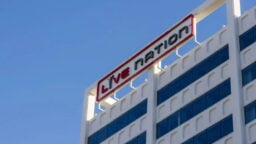We’ve been hearing reports for several years now that the US Department of Justice is – once again – investigating Live Nation and its ticketing division, Ticketmaster, over potential antitrust violations.
Those reports ramped up last month with stories in both the Wall Street Journal and the Washington Post suggesting that a DoJ lawsuit against Live Nation is imminent.
On the company’s Q1 2024 earnings call on Thursday (May 2), Live Nation CFO Joe Berchtold addressed these reports directly, and what he said was certainly illuminating.
For one thing, Berchtold said, the DoJ’s investigation isn’t about concerns that Live Nation (a concert promotion business) and Ticketmaster (a ticketing business) are part of the same company. Rather, they’re focused on what these businesses are doing, independent of each other.
“As we’ve previously stated, the DOJ’s investigation appears to be focused on specific business practices, not the legality of Live Nation/Ticketmaster merger or our overall business structure,” Berchtold told analysts on the call.
He said Live Nation is “just about to begin discussions with senior division leadership [at the DoJ] about the issues their staff has been investigating, which is typically in the final phase of an investigation.”
And he added: “Based on the issues we know about, we don’t believe a breakup of Live Nation and Ticketmaster would be a legally permissible remedy.”
Back in 2010, the DoJ approved the Live Nation-Ticketmaster merger, but set a number of conditions on it, including that it license its ticketing software to rival live event companies, including AEG, and that it sell a subsidiary, Paciolan Inc., to sports and entertainment company Comcast-Spectacor, or another buyer.
Ticketmaster was further limited in its ability to “bundle” services, and was explicitly forbidden from retaliating against venues that choose to leave Live Nation for another promoter, or Ticketmaster for another ticketing company.
“Based on the issues we know about, we don’t believe a breakup of Live Nation and Ticketmaster would be a legally permissible remedy.”
Joe Berchtold, Live Nation
Over the years, some consumer advocates have questioned whether these measures have been effective. In 2020, it was reported that the DoJ had taken “the most significant enforcement action” in the history of its conditional agreements, after concluding that Live Nation had repeatedly violated the condition that it not retaliate against venues that defect to other promoters or ticketing companies.
Nevertheless, Live Nation doesn’t believe the DoJ could force the company to sell Ticketmaster as a remedy to the issues it’s investigating.
This remedy is “only available where there is a strong connection between the corporate structure and the company’s ability to engage in the allegedly unlawful conduct,” Berchtold said on the earnings call.
“We believe that connection is lacking with regard to the bulk of the issues in this investigation, since the conduct under scrutiny falls either within our ticketing segment or within our concert segment and not across those segments.”
He said Live Nation remains “hopeful that we can amicably resolve any remaining disputes. But if not, we’re prepared to defend ourselves in court.”
Berchtold’s comments came after Live Nation reported strong earnings for Q1 2024, with revenue up 21% YoY to $3.8 billion, with an adjusted operating income (AOI) of $367 million, up 15% YoY.
The concerts division saw revenue soar 26% YoY, to $2.9 billion, while Ticketmaster’s ticketing business saw revenue of $723 million, up 7% YoY.
Sponsorships jumped 24% YoY, to $211 million.
Here are three other things we learned on Live Nation’s Q1 earnings call:
1) Live Nation’s businesses would do very well on their own… but that’s not what the company wants
Asked by LightShed Partners analyst Brandon Ross how he would assess Ticketmaster’s value as a standalone company, Live Nation founder and CEO Michael Rapino said all of Live Nation’s businesses “are incredible businesses on their own.”
“I’m very proud that we’ve built three incredible businesses, sponsorships, concerts, and ticketing, and we’re about to embark on our fourth venture around Venue Nation,” Rapino said.
“Together or separate, these would all be very successful businesses. We happen to think that we like our portfolio today and plan on keeping it.”
Michael Rapino, Live Nation
Ross’ question was clearly meant to focus on the possibility that the DoJ may want to break apart Live Nation’s businesses. However, Rapino stressed the value that the merger brought to Ticketmaster. He noted that Ticketmaster was a standalone business for many years before the Live Nation merger.
“We’re proud that, when we took it over, we were able to bring some leadership to it, upgrade its technology, open up its platform, and elevate its consumer and marketplace, much like most enterprise platforms, like Airbnb et cetera,” Rapino said.
He concluded that “together or separate, these would all be very successful businesses,” but “we happen to think that we like our portfolio today and plan on keeping it.”
2) 2025 is going to be a ‘tremendous stadium year’
In its previous earnings call, for Q4 2023, Live Nation signaled that it expects to see somewhat softer numbers for stadium shows this year.
That’s in part to a very high baseline set by stadium shows in 2023, which saw blockbuster tours by the likes of Taylor Swift, Morgan Wallen, and Bruce Springsteen. Those massive tours contributed to the company’s 60% YoY spike in the number of fans attending Live Nation shows.
For 2024, the company sees interest shifting towards smaller venues such as amphitheaters – which isn’t necessarily bad for Live Nation’s bottom line; unlike with stadiums, the company owns its amphitheaters, meaning higher margins on attendance for those shows.
On the latest earnings call, Berchtold singled out Ticketmaster as one business that will see lower growth this year, due to the stadium drought.
He noted that this isn’t due to a decrease in demand; rather it’s a shift in where the demand will be.
“We are seeing no weakness” on demand, Berchtold said.
When looking at artists who toured last year and are touring this year, as a like-for-like comparison, “we’re consistently seeing [that] the sell-through of the shows are at or above where they were last year, and that the overall grosses for the artists are consistently higher. So no issues at all on fan demand relative to last summer,” Berchtold said.
And he made another prediction: 2025 is going to be a “tremendous stadium year.”
“A lot of the stadiums that they couldn’t get access to this year because of the Olympics or Rugby World Cup or any of a variety of reasons, they’re already stacking up very strong for a great stadium year next year,” the Live Nation CFO said.
However, Berchtold noted that this could skew Live Nation’s Q4 numbers, when tickets will start to go on sale for those 2025 stadium shows. That means Live Nation will incur large marketing expenses in Q4, but only see the revenue come through in subsequent quarters.
Ultimately, that’s “irrelevant over the lifecycle of the tour,” Berchtold said, “but from a strict accounting standpoint and impact on margins, the more stadium tours that we put on sale in Q4 globally, the bigger the expense we hit.”
3) Live Nation is going ‘hyperlocal’ in developed markets
What do you do to grow your top line when you’ve maximized your earnings potential in the largest live event markets? You set your sights on developing markets, and smaller cities in developed countries.
That has been Live Nation’s strategy, as evidenced by its rapid expansion into developing markets, especially Latin America, in recent years, and its focus on building new venues.
In emerging markets, the strategy is to build infrastructure, because – as Live Nation has mentioned before – often what’s missing in those markets are venues of sufficient size and quality to attract the kinds of artists and festivals that can grow attendance.
“As we look at the international markets, it’s all a function of how penetrated [they are] in the major cities where we have a presence. In a lot of markets, we think that there is the opportunity for driving that through additional venues.”
Joe Berchtold, Live Nation
“As we look at the international markets, it’s all a function of how penetrated [they are] in the major cities where we have a presence. In a lot of markets, we think that there is the opportunity for driving that through additional venues,” Berchtold said.
“In other markets that may be more penetrated, like the UK, you’re going to see more of a hyperlocal strategy, which is why [we have a] continued focus on… making sure we got a lot of activity going in Manchester, not just London.”
The hyperlocal strategy “has absolutely been helping us drive our penetration, on a per-fan basis. That’ll continue, and our expectation is we’ll continue to build our fan base in North America,” Berchtold said.Music Business Worldwide





